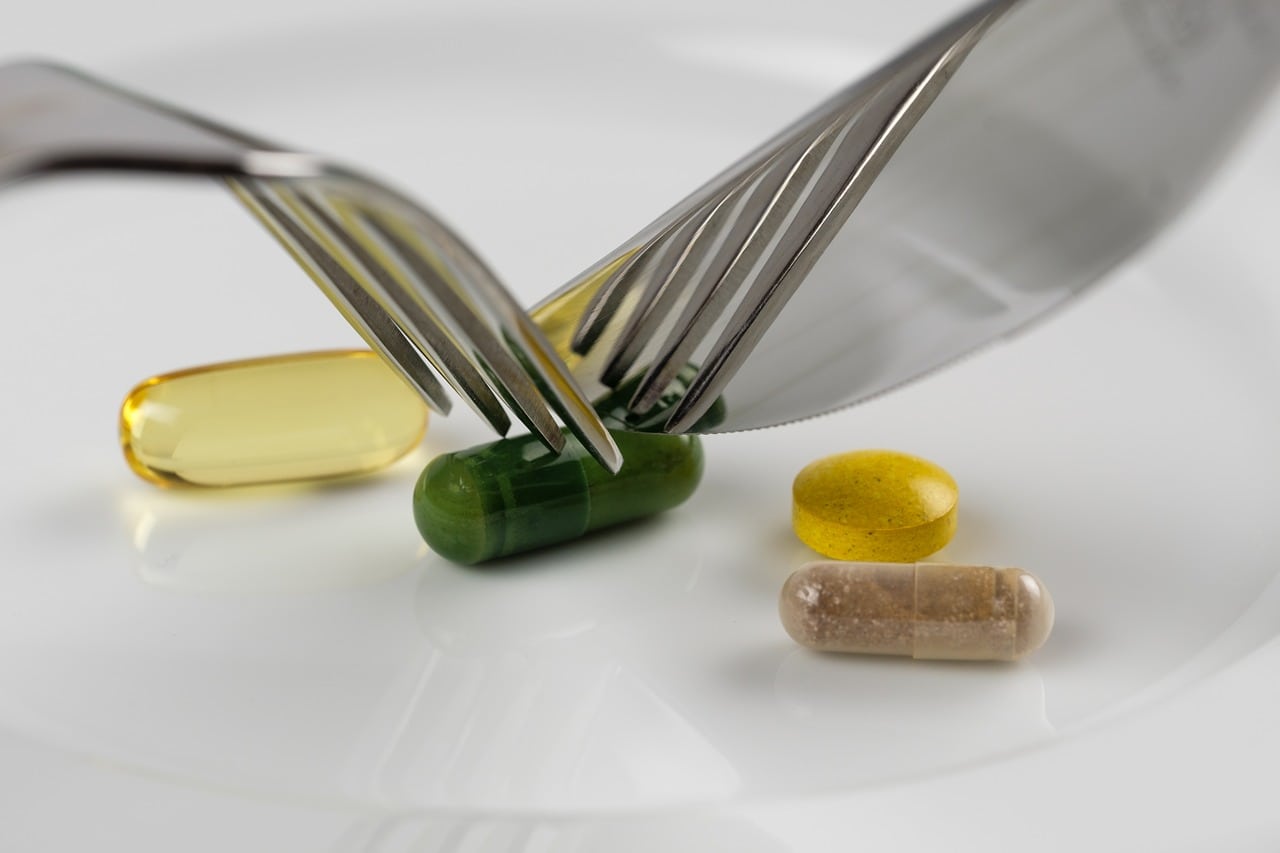First and foremost, supplements cannot, should not, and will not ever be your sole source of nutrients. Most of the human body’s required micronutrients come naturally through diet. Of course, this assumes you’re eating a well-rounded diet of whole foods. Athletes particularly need to make sure they are getting enough calories in their diet, but certain macronutrients are necessary for maximal absorption and uptake of supplements–these will be discussed in each relevant supplement section.
Next,not all athletes have the same sport goals. Runners are not trying to build a large amount of muscle, bodybuilders are not focused on cardiovascular endurance, and some athletes want the best of both worlds. This guide will gear supplement suggestions toward these goals.
Finally, there are general methods for maximizing the value and efficacy of your supplements. With all that in mind, the following guide will cover:
- When to take your supplements for maximum uptake
- Where applicable, the different supplement profiles recommended for runners, bodybuilders, or overall wellness
- Various tips and tricks for maximizing supplement effectiveness
Fueling Your Body

When you work out, your body requiresfuel. There are 3 major fuel sources, and your body decides when to use them differently. Primarily, your body relies on oxygen for energy, and this works for activities that are mostly aerobic. However, some activities require energy faster than your body can pump oxygen, so your body begins producing anaerobic energy.
Glycogen, which comes from carbohydrates, is a readily-available source of anaerobic energy that your body uses for ‘fast twitch’ exercises like sprinting, lunges, and other cardio-intensive workouts. On the other hand, fat is stored by the body as a long-term source of anaerobic energy for low-intensity activity or when there isn’t any more glycogen to burn. Bottom line: before you consider supplements, make sure you’re giving your body enough energy to perform.
Protein
Although protein is a macronutrient, it’s hard for athletes to eat their daily requirement, so it’s often recommended that they supplement their protein intake with something like powder. As a general rule of thumb, any supplement powder should mix easily in water. That is, lumpy shakes can indicate cheap powder ingredients.
Protein is getting its own section in this blog because it is critical for all types of athletesand is recommended at any time–pre, during, or post workout. The protein source (e.g. whey, egg, rice, pea, etc.) is mostly important in terms of any dietary allergens you might have, but otherwise it is most important to buy protein isolates and complete proteins. Protein isolates guarantee that 90-95% of your powder is pure protein, which means you’re getting what you pay for. Many cheap proteins will not adequately filter out other parts like carbs or fats, which you should be getting elsewhere anyway. Finally, complete proteins include all 9 essential amino acids, of which you can never get enough. For more details about protein, see The Ultimate Guide to Protein Supplements.
Hydration
Another topic worth its own section, hydration is an obvious requirement for athletes. Usually, this just means water, but electrolyte-enriched beverages are also recommended. Directly, keeping your body hydrated helps with muscle recovery, mental acuity, and lactic acid control. However, indirectly, water improves digestion–meaning that your supplement intake will be more effective–and it helps with kidney and liver function–which makes sure you’re fully processing your supplements and staying healthy. For more hydration information, see 15 Hydration Facts for Athletes.
Pre Workout

Since it can be hard to eat whole foods during your workout, it’s extremely important to do so beforehand. First, it’s important to eat plenty of calories and far enough in advance. This will obviously help to avoid stomach pains, but it will also make sure the food is fully digested and the body can use it. Second, ensure that the macronutrient breakdown is heavy on carbohydrates so you have enough fuel for high-intensity activity, but also include some fat for when your body uses up all its glycogen. Finally, to help with uptake speed (and possibly taste), take your pills with juice.
Overall
Caffeine is known for its energy-inducing effects, but, in moderation, it has also been shown to improve mental focus and, thus, performance. Importantly, caffeine is most effective in anhydrous form (without water), so while, yes, you can just drink a cup of coffee, it’s better to take it purely in pill form.
Potassium is critical for managing the fluids and electrolytes in your body, which, in turn, help maintain a healthy heart rate and avoid muscle cramps. It can be as easy as eating a banana (which is filling and also has carbs for energy) or taking a supplement.
Runners
Beet or Beetroot Extract can help your body use oxygen more efficiently, increasing endurance and reducing fatigue. In a 2010 study conducted by the University of Exeter in the UK, beetroot juice was found to increase endurance to the point where test subjects could run up to15% longer at the same pace or complete races faster.
Beta-Alanine is type of amino acid that, according to the National Institute of Health, can improve high-intensity activity performance and help maintain lean body mass. This works intandem with your other supplements to make sure your muscle growth helps with strength and doesn’t just turn into body mass that is unsustainable for running.
Magnesium is a mineral that will help your endurance. Specifically, magnesium promotes muscle and bone health, but more importantly it helps with muscle contraction. This means your muscles will fatigue less quickly when running longer distances.
Bodybuilders
Far and away, Creatine is the most effective and researched pre-workout supplement for weightlifters. In fact, studies have shown the effect of creatine to be negligible for endurance athletes like long-distance runners. Creatine essentially tells your body to use its short-term energy stores more effectively. As mentioned previously, when you ask your body to perform at sustained high-intensity, your body wants to convert from oxygen to glycogen as a fuel source. Unfortunately, continued glycogen processing can lead to undesirable side effects likelactic acid buildup and fatigue. Creatine solves this problem by essentially storing aerobic energy for later use. Thus, when the body cannot sustain activity aerobically, it will start to use the creatine-based energy before glycogen.
Intra/During Workout

Depending on the length of your workout, you may need to consume more fuel and nutrients during your session. More than anything, you should stay hydrated during your workout to avoid exercise-induced nausea and replenish the water your body sweats out. In general, intra-workout supplements are a waste of money because your pre-workout and post-workout supplements should be enough. In fact, more often than not, your body will peak in uptake rate of most nutrients 1-2 hours after eating, so your pre-workout meal should last. Additionally, fat-soluble supplements are hazardous in too much concentration, so if you’re already taking some of these pre-and post-workout, adding them to your intra-workout routine could be dangerous. Of course, if you’re a marathon runner or your training sessions go beyond 2 hours, you can consider intra-workout supplements.
Overall
Since high-intensity workouts generally deplete your glycogen stores first, this will be the first supplement you might need to retake during your workout. This is as easy as eating a bar or shake loaded with carbs. Next, your workout is actively taxing your muscles, which contribute BCAAs for quick energy. As BCAA levels in your muscles deplete, fatigue setsin, so replenish these during your workout.
Post Workout

Once you are finished with your workout, your body starts the recovery process. Regardless of your sport of choice, your muscles need help and you need to battle inflammation. Therefore, this section is not broken out by runners vs. bodybuilders because all the following supplements are beneficial to any type of athlete.
Overall
Fish Oil and Turmericare naturally anti-inflammatory, which means they help with muscle soreness and recovery. To avoid the fishy taste associated with taking fish oil capsules, keep your fish oil capsules frozen.
BCAAs (Branched Chain Amino Acids) are critical for muscle repair. Obviously, weightlifting results in muscle tears, so muscle repair is extremely important. Even though runners aren’t building tons of muscle, some of the largest muscles in the human body are in the legs, and runners put a lot ofstress on their legs every time they run. Runners can get away with less protein than bodybuilders, at about 100g per day.
Vitamin D and Calcium help with bone health, which is important considering the strain running puts on your legs. While Vitamin D is usually naturally received from sunlight, the typical human does not get enough. Vitamin D also helps with overall mental health and demeanor, which can be important for staying motivated.
Potassium is just asimportant in your post workout as it was in your pre workout. After an intense run or workout, potassium levels in your body are out of balance, so ingesting some immediately will help with muscle recovery and hydration. Don’t worry, you can safely ingest up to 3 times the recommended daily dose of potassium, so feel free to take some pre AND post workout.
Glutamine, Probiotics, Vitamin C, and Vitamin E are discussed together here because they are all geared toward one thing: promoting immune health. Muscle growth, performance, and recovery are all reliant upon a healthy body, so your efforts are worthless if your immune system is stressed or broken. Glutamine is a non-essential amino acid that helps specifically with muscle repair and hydration. Probiotics are generally recommended for gut health, and modern science is finding that over 70% of illness can be traced to problems with your stomach flora. Finally, Vitamin C and E are age-old immune boosters.